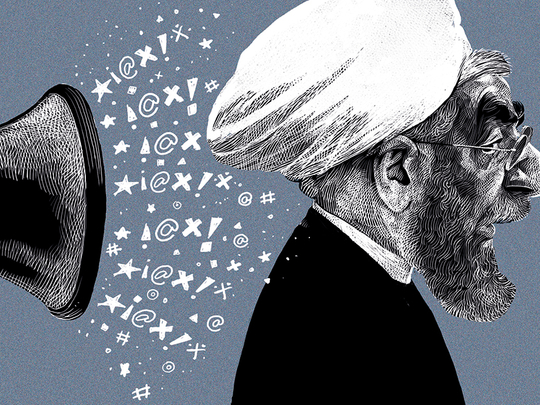
A fierce contest in the May 19 Iranian presidential election looks likely to go to a second round, in which the hardliners hope that their candidate will be able to challenge incumbent President Hassan Rouhani more effectively. The outcome will probably have a dramatic effect on Iran’s economy and international standing as well as the workings of the controversial nuclear deal, but is not likely to alter Iran’s policy of political and sectarian meddling across the region as all the presidential candidates support it.
The two leading conservative candidates, Ebrahim Raisi and Mohammad Baqer Qalibaf, have both abandoned traditional hardline rhetoric focused on the Islamic values of the Republic. Instead they are making populist promises concerning economic development, jobs and living standards. They have even gone so far as to echo Ayatollah Khomeini’s 1979 promises immediately after the Revolution when he offered free water, free electricity and free buses. But coupled with this rampant populism, today’s conservative candidates are making increasingly savage attacks on their opponents, and on Rouhani in particular who they have accused of corruption, being a lackey of the West, incompetence, stupidity and espionage, to list only a few of their observations.
An interpretation of this was offered by Haghighat Nejad in IranWire when she pointed out that Raisi who was predicted to be Rouhani’s most serious rival, has not only failed to incite an electoral groundswell, but he has also had difficulty competing with Qalibaf during the presidential debates. And although former Tehran mayor Qalibaf now has a better chance than Raisi, he has been unable to achieve the edge that could guarantee him a win in the election. But Qalibaf does not represent any party, so he has no natural voter base and therefore he has to win over supporters from Raisi or Rouhani.
As the rivalry between the two hardliners intensifies, the numbers are clear: Neither Qalibaf nor Raisi has a chance of getting more than 50 per cent and therefore a quick win on May 19. So their only chance for success is to force the election into a second round, and both Qalibaf and Raisi are doing their best to ensure they will be the one to go head-to-head with Rouhani, which is why they have abandoned their traditional rhetoric in favour of the Islamic Revolution and its values and gone for blatantly populist issues to gather numbers.
Supreme Leader
One of the ironies of this election is that both Rouhani and Raisi may be looking at another prize from their very different positions. Both know that real power in Iran lies with the Supreme Leader and the current holder of that post, Ayatollah Ali Khamenei, is elderly and ailing if still vociferous. Raisi is thought to be Khamenei’s favourite to succeed him. The supreme leader clearly backed Raisi in his bid for the presidency when in 2016 he appointed Raisi, a longtime state prosecutor and judicial official, as head of the large economic conglomerate (Astan-e-Qods Razavi Foundation) in Mashhad, and the source of substantial money and subsidies that can be used to bolster Raisi’s appeal to rural and working class voters.
Khamenei also offered outspoken criticism of Rouhani for failing to advance the “resistance economy”, which is the hardline concept of building up Iran’s domestic industries and reducing reliance on imports, and saying that Rouhani was “not correct” when he said that “the shadow of war has faded away”, as Rouhani had referred to in citing the success of the Joint Comprehensive Plan of Action (JCPOA).
The administration of United States President Donald Trump has never had any good will towards Iran, in a complete turnaround from former president Barack Obama’s efforts to first get and then work with the nuclear deal. Indeed, US Secretary of State Rex Tillerson has said that the JCPOA, “only delays [Iran’s] goal of becoming a nuclear state” and that it has failed to curb Iran’s objectionable regional behaviour. He announced a complete review of American policy towards Iran, including the JCPOA, although he has held back from any specific thoughts during the Iranian campaign in order not to damage Rouhani’s chances. It is very clear that a new hardline president will discontinue Rouhani’s efforts to open up diplomatic relations with the West, and may resort to former president Mahmoud Ahmadinejad’s style of open provocation.
Even so, in recent weeks, the Trump administration has imposed new sanctions on additional entities allegedly supporting Iran’s missile programme and has launched strikes on Iran’s key regional ally, Syria, for its use of chemical weapons. The US administration has also said that it was thinking of increasing its practical support for the Saudi Arabia-led coalition fighting Al Houthi rebels in Yemen in support of the legitimate government.
And on May 19, Trump is heading for Saudi Arabia for his first presidential trip abroad. Iran, its constant meddling in the internal affairs of Arab states, and the JCPOA are bound to be very high on the agenda.








